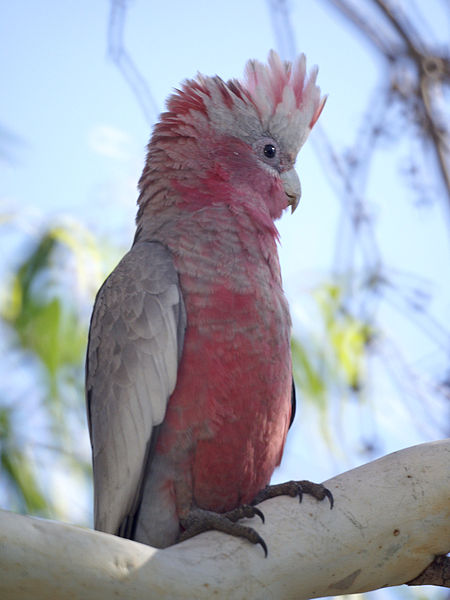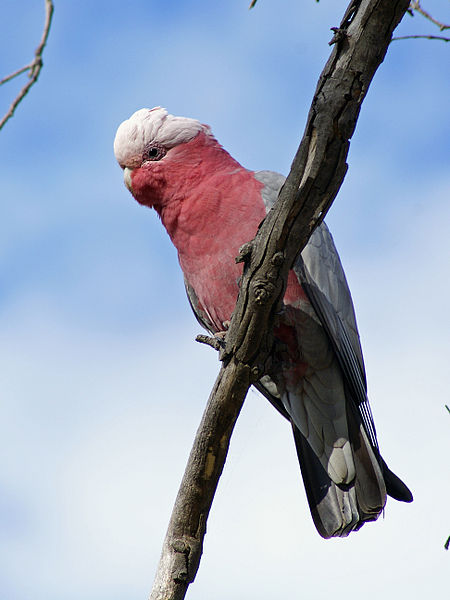When most people think of a cockatoo, the image of a large white bird with a magnificent, tall crest comes to mind. This is not at all the description of the rose-breasted cockatoo, also known as the “galah”.
They have stocky bodies of grey and vibrant pink and their erected crest looks like a delicate tiara compared to the lavish crests of the larger cockatoos.
In personality, they are less demanding of attention than the white cockatoos and cannot correctly be called “cuddlers”. But make no mistake about it, they are cockatoos through and through, and are prone to the same biting and screaming problems faced by dismayed cockatoo owners everywhere.

The rose-breasted cockatoo is very sensitive to its environment and takes particular notice of your handling (with emphasis on any mishandling.) When things are not done correctly, or if your bird feels you are failing in your duties, he will surely let you know in the most unpleasant way possible. Their lifespan is generally between 20 and 40 years and a lot depends on their diet and exercise levels.
Your rose breasted cockatoo will need a spacious cage to roam in and lots of toys and foraging opportunities to keep it physically fit and entertained. It will expect a lot of out-of-cage time and plenty of one on one attention from you.
Cockatoos are narcissistic. They believe that you get out of bed each day to tend to their needs and they have little patience for trivialities like your job or social engagements. The wise rose-breasted cockatoo owner will see that their bird is comfortable with every member of the household and that it won’t feel slighted in your absence.
Rose-Breasted Cockatoo Training
Below are a few guidelines when working with your Rose Breasted Cockatoo. Train away the nipping. Your Galah Cockatoo is going to go through a nippy phase. This generally happens when they become adolescent birds, between the ages of 2 and 5.
Rose Breasted Cockatoo Training will eliminate the nipping and the first step in that is by passively ignoring it. If your Rose Breasted Cockatoo has already reached this phase and likes to nip, you can eliminate it by remaining calm and virtually emotionless when he bites.

Rose Breasted Cockatoo Biting
This means that you don’t jerk your hand away when he bites. You don’t yell or scream, you don’t punish, and you don’t put him back in his cage. All of these reactions, natural reactions to being sure, are reinforcing your Galah Cockatoo Behavior.
If you want to eliminate the behavior, ignore it. When he doesn’t get the desired reaction he will generally cease the behavior. You can also train your Rosie to be more accommodating.
For example, the simple tricks to step up and step down when you take him from his cage or put him back into it are excellent Positive Training to stop him from biting you when you reach inside his cage.
Rose Breasted Cockatoos are very smart birds and they generally respond quite quickly to training. Stimulate your Galahs intelligence. Rose-breasted cockatoos are independent and they generally enjoy being in their cage – if it is accommodating to them. If he is unhappy in his cage, he’ll let you know it by screaming and biting.
To make your Rosie’s cage more pleasant for him make sure that it is large enough for him to explore and that it is kept clean. You’ll also want to include a number of toys to keep your Rosie active and engaged in his environment.
To eliminate or reduce screaming make sure your Rose Breasted Cockatoos cage is constantly stocked with several new toys. Always try to have at least one puzzle-type toy in his cage. The more he is entertained with new toys and activities the happier and less stressed out your Rose Breasted Cockatoo will be.
Understand your Rose Breasted Cockatoo’s fear
Rose Breasted Cockatoos are afraid of change. Whether you have a new addition to the family or construction going on in your home or nearby change is absolutely terrifying for your bird. Fear often breeds bad behavior in humans as well as birds. It’s an attempt to control their environment.
If you want to teach your bird to adapt to change and cope with it, you can isolate them and protect them from change, not an entirely feasible solution, or you can train them to think through change.
Positive Training teaches your bird to use its problem-solving skills. When your bird is able to use these skills, he can assess whether a situation more accurately. Now this doesn’t mean that he isn’t going to have a reaction to change, we all react to change in one way or another, but what Rose Breasted Cockatoo Training will do is give him better-coping skills. The reaction with your Galah Cockatoo won’t be as strong or as destructive.
